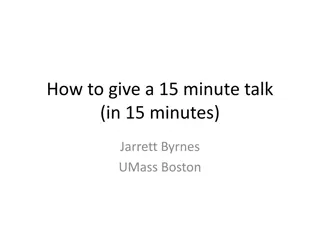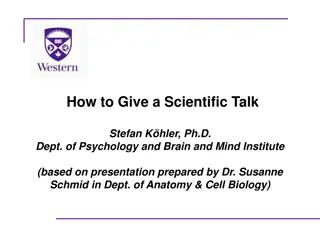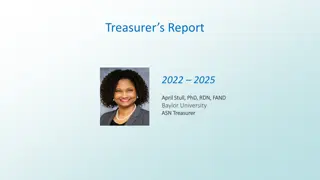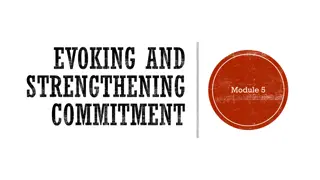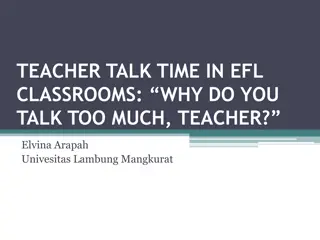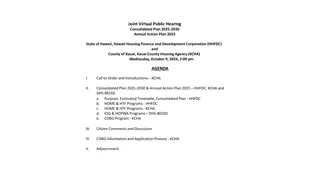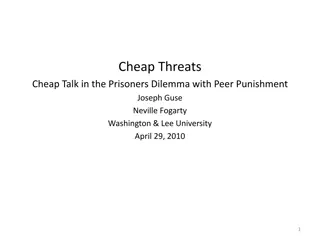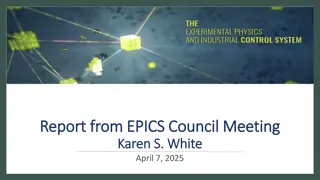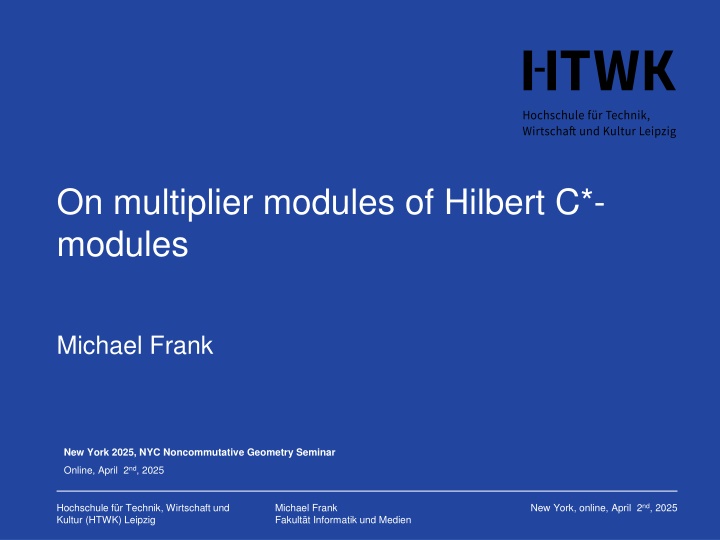
Approaches to Multiplier Modules of Hilbert C*-Modules
Discover the two main approaches to the theory of multiplier modules of Hilbert C*-modules by renowned mathematicians Damir Baki, Boris Gulja, Matthew Daws, and more. Uncover unique insights into C*-algebras, inner products, and norm generation in the context of A-valued inner products on Banach A-modules.
Uploaded on | 1 Views
Download Presentation

Please find below an Image/Link to download the presentation.
The content on the website is provided AS IS for your information and personal use only. It may not be sold, licensed, or shared on other websites without obtaining consent from the author. If you encounter any issues during the download, it is possible that the publisher has removed the file from their server.
You are allowed to download the files provided on this website for personal or commercial use, subject to the condition that they are used lawfully. All files are the property of their respective owners.
The content on the website is provided AS IS for your information and personal use only. It may not be sold, licensed, or shared on other websites without obtaining consent from the author.
E N D
Presentation Transcript
On multiplier modules of Hilbert C*- modules Michael Frank New York 2025, NYC Noncommutative Geometry Seminar Online, April 2nd, 2025 Hochschule f r Technik, Wirtschaft und Kultur (HTWK) Leipzig Michael Frank Fakult t Informatik und Medien New York, online, April 2nd, 2025
On multiplier modules of Hilbert C*-modules There are at least two approaches to a theory of multiplier modules of Hilbert C*-modules. I would like to stay with the approach by Damir Baki and Boris Gulja (2003) in [5,6] which focusses on a given C*-algebra A and on a given full Hilbert A-module {X, <.,.>} where the A-valued inner product <.,.> on X is considered within its class of unitary equivalence. This allows to rely on the notions of "compact" and adjointable operators without reference to possibly existing not unitary equivalent inner products on X inducing equivalent norms. KA(X) becomes unique. Hochschule f r Technik, Wirtschaft und Kultur (HTWK) Leipzig Michael Frank Fakult t Informatik und Medien 2
On multiplier modules of Hilbert C*-modules Noticed by Bartosz Kwasniewski I became aware of the double-centralizer based definition of multiplier modules initiated by Matthew Daws in [D1,D2] (2010) and considered in depth by Alcides Buss, Bartosz Kwasniewski, Andrew McKee and Adam Skalski in [BKMS] (2024). Cf. [EchRae, Delf n] for representations. They work with Banach A-B bimodules X connecting two given C*-algebras A and B as *-correspondences, specializing finally on imprimitivity bimodules (or: Hilbert A-B bimodules) in the style of strong Morita equivalence of C*-algebras. C*-valued inner products appear late in the considerations. Hochschule f r Technik, Wirtschaft und Kultur (HTWK) Leipzig Michael Frank Fakult t Informatik und Medien 3
On multiplier modules of Hilbert C*-modules Theorem: [Lance, Thm.], [Blecher, Thms. 3.1, 3.2], [Frank, Thm. 5], [Solel, Thm. 1.1] Let A be a C*algebra and X be a left Banach A-module the norm of which is known to be generated by an A- valued inner product on X with unknown values. Then this A-valued inner product <.,.> on X is unique, and the values can be recovered by the formulae <x,x> := sup {r(x)*r(x) : r in X with ||r|| 1} <x,y> := . k=1..4 ik .<x+iky, x+iky> for every x,y in X , where the right side uses the norm of the underlying Banach A-module only. Hochschule f r Technik, Wirtschaft und Kultur (HTWK) Leipzig Michael Frank Fakult t Informatik und Medien 4
On multiplier modules of Hilbert C*-modules Consequences: Every bijective isometric A-linear isomorphism of two Hilbert A-modules T identifies the two A-valued inner products by the formula <.,.>2= <T(.), T(.)>1, T*=T-1if onto, and vice versa. [Solel, Thm. 3.3] The Linking C*-algebras of two isometrically isomorphic Hilbert A-modules are *-isomorphic. The completely boundedness structures on isometrically isomorphic Hilbert A-modules are the same, derived from the A-valued inner product (values). Hochschule f r Technik, Wirtschaft und Kultur (HTWK) Leipzig Michael Frank Fakult t Informatik und Medien 5
Settings Hochschule f r Technik, Wirtschaft und Kultur (HTWK) Leipzig Michael Frank Fakult t Informatik und Medien 6
On multiplier modules of Hilbert C*-modules C*-algebras: Norm-closed *-subalgebras of W*-algebras B(H) of all bounded linear operators on Hilbert spaces H . W*-algebras or von Neumann algebras: Norm-closed *-subalgebras of W*-algebras B(H) of all bounded linear operators on Hilbert spaces H which coincide with their bicommutant. We focus on non-unital C*-algebras A to get meaningful derived constructions and on C*-algebras where they are two-sided ideals. Hochschule f r Technik, Wirtschaft und Kultur (HTWK) Leipzig Michael Frank Fakult t Informatik und Medien 7
On multiplier modules of Hilbert C*-modules C*-algebras Considering C*-algebras (and Hilbert C*-modules) there are some points to respect: Possible existence of non-zero zero-divisors Possible non-commutativity of multiplication Inner one-/two-sided norm-closed ideal structure Possible existence of non-trivial orthogonal and skew projections a rich algebraic, topological, noncommutative theory with more derived structures Hochschule f r Technik, Wirtschaft und Kultur (HTWK) Leipzig Michael Frank Fakult t Informatik und Medien 8
On multiplier modules of Hilbert C*-modules Hilbert C*-modules (full most offen today) Let A be a C*-algebra and X be a complex-linear space and (right) A-module where both the complex-linear structures are compatible. Let X admit a map <.,.>: X X A conjugate-A-linear in the first and A-linear in the second variable such that (i) <x,y> = <y,x>* for any x,y in M, (ii) 0 <x,x> for any x in M, (iii) <x,x> = 0 iff x=0. Then ||x|| := ||<x,x>||A1/2defines an A-module norm on X. Examples . Hochschule f r Technik, Wirtschaft und Kultur (HTWK) Leipzig Michael Frank Fakult t Informatik und Medien 9
On multiplier modules of Hilbert C*-modules Hilbert C*-modules A Hilbert C*-module X over a C*-algebra A is said to be full iff A is the norm-closed linear span of the set { <x,y> : x,y in X } . We write A=<X,X> . Two A-valued inner products on X are unitarily equivalent iff there exists a bounded adjointable invertible module operator T on X such that <x,y>2=<T(x),T(y)>1for any x,y in X. Hochschule f r Technik, Wirtschaft und Kultur (HTWK) Leipzig Michael Frank Fakult t Informatik und Medien 10
On multiplier modules of Hilbert C*-modules Multipliers of C*-algebras A - a (non-unital) C*-algebra, faithfully *-represented on H M(A) = {m in B(H): ma, am in A for any a in A} - a unital C*-algebra where A is a two-sided norm-closed ideal (the multiplier algebra of A) LM(A) = RM(A)* = {m in B(H) : ma in A for any a in A} - a unital Banach algebra (the left/right multiplier algebra) QM(A) = {m in B(H) : bma in A for any a,b in A} - an involutive Banach space (the quasi-multiplier space) Hochschule f r Technik, Wirtschaft und Kultur (HTWK) Leipzig Michael Frank Fakult t Informatik und Medien 11
On multiplier modules of Hilbert C*-modules Multiplier algebras Universal property of M(A): For any C*-algebra D containing A as a two-sided ideal, there exists a unique *-homomorphism : D M(A) such that extends the identity homomorphism on A and (A ) = {0}. In particular, if the two-sided ideal A is an essential ideal in D (i.e. A ={0} in D) then D is *-isometrically embeddable in M(A). So, M(A) is the largest C*-algebra where A is essential. Hochschule f r Technik, Wirtschaft und Kultur (HTWK) Leipzig Michael Frank Fakult t Informatik und Medien 12
On multiplier modules of Hilbert C*-modules Multipliers of C*-algebras The elements of the different types of multipliers can be calculated w.r.t. any von Neumann or monotone complete C*-algebra where A is faithfully *- represented, cf. [7,11,28,32]. We get C*-isomorphisms. Multiplier algebras might admit an entire lattice of non- unital, two-sided, non-isomorphic ideals A such that M(A ) = M(A ) for any two of them, cf. [20]. There are other calculation methods like double centralizers Hochschule f r Technik, Wirtschaft und Kultur (HTWK) Leipzig Michael Frank Fakult t Informatik und Medien 13
On multiplier modules of Hilbert C*-modules Operators on Hilbert C*-modules cf. [28] KA(X) - the C*-algebra of all "compact" A-linear operators on X, norm-closed linear hull of elementary operators { x,y : x,y (z) = y.<x,z> with z in X} EndA*(X) - the C*-algebra of all bounded adjointable A- linear operators on X = M(KA(X)) EndA(X) - the Banach algebra of all bounded A-linear operators on X = LM(KA(X)) EndA(X,X ) - the Banach space of all bounded A-linear operators from X to X = QM(KA(X)) Hochschule f r Technik, Wirtschaft und Kultur (HTWK) Leipzig Michael Frank Fakult t Informatik und Medien 14
On multiplier modules of Hilbert C*-modules Example Hochschule f r Technik, Wirtschaft und Kultur (HTWK) Leipzig Michael Frank Fakult t Informatik und Medien 15
On multiplier modules of Hilbert C*-modules Example (continued) Consider A as a Hilbert A-module over itself in two ways: <a,b>A:= a*b for a,b in A <a,b>1:= a*T*Tb = <T(a),T(b)>A for a,b in A One can calculate: Hochschule f r Technik, Wirtschaft und Kultur (HTWK) Leipzig Michael Frank Fakult t Informatik und Medien 16
On multiplier modules of Hilbert C*-modules Example Then: A = KA(A) KA,1(A) *-isomorphically as C*-algebras M(A)= EndA*(A) EndA,1*(A) *-isomorphically as C*- algebras cf. [11]. Either M(A)=LM(A) and LM(A)=QM(A), or M(A) LM(A) QM(A), cf. [8, Cor. 4.18]. Hochschule f r Technik, Wirtschaft und Kultur (HTWK) Leipzig Michael Frank Fakult t Informatik und Medien 17
Multiplier modules of Hilbert C*-modules Hochschule f r Technik, Wirtschaft und Kultur (HTWK) Leipzig Michael Frank Fakult t Informatik und Medien 18
On multiplier modules of Hilbert C*-modules Multiplier modules ([5,6]) Let {X, <.,.>} be a full Hilbert C*-module over a given (non-unital) C*-algebra A . An extension of X is a triple (Y,B, ) such that (i) B is a C*-algebra containing A as a two-sided norm- closed ideal. (ii) Y is a Hilbert B-module. (iii) : X Y is a bounded module map satisfying < (x), (y)>Y= <x,y>Xfor any x,y in X. (iv) Im( ) = Y.A = {za : z in Y, a in A} = {x in Y : <x,x> in A} The triple (Y,B, ) is an essential extension of X, if A is an essential ideal of B. Then M(X) is the maximal one. Hochschule f r Technik, Wirtschaft und Kultur (HTWK) Leipzig Michael Frank Fakult t Informatik und Medien 19
On multiplier modules of Hilbert C*-modules Multiplier modules ([5,6]) Let {X,<.,.>} be a (not necessarily full) Hilbert C*-module over a given (non-unital) C*-algebra A. Denote by M(X) the set of all adjointable maps from A to X, i.e. M(X) := EndA*(A,X). Obviously, M(X) is a Hilbert M(A)-module with the M(A)- valued inner product <z1,z2> = z1*z2 for z1,z2in M(X). The resulting Hilbert M(A)-module norm coincides with the operator norm on M(X). We call M(X) the multiplier module of X. It is a maximal extension of X, in case X is full. X = KA(A,X). Hochschule f r Technik, Wirtschaft und Kultur (HTWK) Leipzig Michael Frank Fakult t Informatik und Medien 20
On multiplier modules of Hilbert C*-modules Multiplier modules [EchRae,Schw,D1,D2,BKMS,Del] Let A,B be strongly Morita equivalent C*-algebras and X be an appropriate imprimitivity A-B bimodule. A pair of maps (R,L) in EndA(A,X) EndB(B,X) such that aL(b)= R(a)b, for any a in A, b in B, is called a multiplier of X. The multiplier module M(X) of X is the set of all multipliers of X, a M(A)-M(B) Hilbert bimodule. KA(A,X) = KB(B,X) = X M(X) = EndA*(A,X) = EndB*(B,X) Hochschule f r Technik, Wirtschaft und Kultur (HTWK) Leipzig Michael Frank Fakult t Informatik und Medien 21
On multiplier modules of Hilbert C*-modules Theorem: [EchRae, Prop. A.1] Let A be a C*-algebra and X be a full Hilbert A-module. Then the multiplier module M(X) can be isometrically isomorphically identified with the right upper corner of the multiplier algebra M(L(X)) of the linking algebra L(X) . However, the linking algebra L(M(X)) is smaller-equal to M(L(X)), generally speaking, and L(M(X)) might be non-unital. Hochschule f r Technik, Wirtschaft und Kultur (HTWK) Leipzig Michael Frank Fakult t Informatik und Medien 22
On multiplier modules of Hilbert C*-modules Pairings and their uniqueness Proposition: For a given pair of C*-algebras (A,M(A)) , let X1, X2be two full Hilbert C*-modules over A such that their multiplier modules M(X1), M(X2) are isometrically isomorphic as Hilbert M(A)-modules. Then X1and X2 are isometrically isomorphic as Hilbert A-modules to M(X1)A = M(X2)A resp.. So, the pairings (X,M(X)) are bound to each other for given C*-algebras (A,M(A)) up to unitary equivalence. Hochschule f r Technik, Wirtschaft und Kultur (HTWK) Leipzig Michael Frank Fakult t Informatik und Medien 23
On multiplier modules of Hilbert C*-modules Pairings and their uniqueness Proposition: Suppose, we have two non-isomorphic C*-algebras A1 and A2such that they admit the same multiplier C*- algebra M(A) . Let X1 be a full Hilbert A1-module and X2a full Hilbert A2-module such that M(X1) and M(X2) are unitarily isomorphic as Hilbert M(A)- modules. Then X1is not unitarily isomorphic to X2as a Hilbert M(A)-module ( M(X1)A1=X1, M(X2)A2=X2). Hochschule f r Technik, Wirtschaft und Kultur (HTWK) Leipzig Michael Frank Fakult t Informatik und Medien 24
On multiplier modules of Hilbert C*-modules Topological characterization Let A be a C*-algebra and X be a Hilbert A-module. Let the strict topology on M(X) be induced jointly by the two families of semi-norms {z za : a in A} and {||<z,x>|| : x in X, ||x|| 1} for z in M(X) . It is a locally convex topology. The multiplier module M(X) turns out to be complete with respect to this strict topology, and M(X) is the strict completion of X , [5, Thm. 1.8, 1.9]. Moreover, the strict completion is an idempotent operation, i.e. MM(A)(MA(X)) = MA(X). Hochschule f r Technik, Wirtschaft und Kultur (HTWK) Leipzig Michael Frank Fakult t Informatik und Medien 25
On multiplier modules of Hilbert C*-modules A Morita-like point of view Theorem: cf. [EchRae, Prop. 1.3] Let A be a C*-algebra and M(A) be its multiplier algebra. Let X be a full (right) Hilbert A-module and M(X) be its multiplier module, a full (right) Hilbert M(A)-module. Then M(X) is also the full (left) multiplier module of the (left) Hilbert KA(X)-module X with respect to the pairing of C*-algebras KA(X) and M(KA(X)) = EndA*(X) = M(KM(A)(M(X))) = EndM(A)*(M(X)) , and vice versa. There are non-unital, strongly Morita equivalent C*- algebras without multiplier imprimitivity bimodules. Hochschule f r Technik, Wirtschaft und Kultur (HTWK) Leipzig Michael Frank Fakult t Informatik und Medien 26
On multiplier modules of Hilbert C*-modules *-Isomorphism of key operator C*-algebras [5, Thm. 2.3]. For X,Y Hilbert A-modules each operator T in EndA*(X,Y) has an extension TM in EndM(A)*(M(X),M(Y)) with the same norm value obtained as the strict continuation of T . Therefore, it is uniquely determined. Moreover, every operator in EndM(A)*(M(X),M(Y)) arises this way, i.e. the C*-algebras EndM(A)*(M(X),M(Y)) and EndA*(X,Y) are *-isomorphic. This covers also the non-full variant of the definition. Hochschule f r Technik, Wirtschaft und Kultur (HTWK) Leipzig Michael Frank Fakult t Informatik und Medien 27
On multiplier modules of Hilbert C*-modules "Compact" operator C*-algebras Theorem: Let A be a C*-algebra with multiplier algebra M(A) . Let X be a full Hilbert A-module and M(X) be its full multiplier module. The C*-algebra KA(X) of all "compact" operators on X admits a *-isomorphic embedding into the C*-algebra KM(A)(M(X)) of all "compact" operators on M(X). KA(X) is smaller than KM(A)(M(X)) if X M(X). Hochschule f r Technik, Wirtschaft und Kultur (HTWK) Leipzig Michael Frank Fakult t Informatik und Medien 28
On multiplier modules of Hilbert C*-modules Bounded module operator algebras Theorem: Let A be a C*-algebra with multiplier algebra M(A) . Let X be a full Hilbert A-module and M(X) be its full multiplier module. There does not exist any bounded M(A)-linear map T0: M(X) M(X) such that T0 0 on M(X), but T0= 0 on X M(X) . Hochschule f r Technik, Wirtschaft und Kultur (HTWK) Leipzig Michael Frank Fakult t Informatik und Medien 29
On multiplier modules of Hilbert C*-modules Bounded module operator algebras Theorem (continued): The Banach algebra EndM(A)(M(X)) admits an isometric embedding into the Banach algebra EndA(X) by restricting an element on the domain from M(X) to X M(X). If the left multiplier algebra of KA(X) is larger than the multiplier algebra of it, then EndM(A)(M(X)) can be smaller than EndA(X), i.e. not every bounded module operator might admit a bounded module operator continuation. (Existing continuations are unique.) Hochschule f r Technik, Wirtschaft und Kultur (HTWK) Leipzig Michael Frank Fakult t Informatik und Medien 30
On multiplier modules of Hilbert C*-modules Bounded module functionals Theorem: Let A be a C*-algebra with multiplier algebra M(A). Let X be a full Hilbert A-module and M(X) be its full multiplier module. There does not exist any bounded M(A)-linear map f0: M(X) M(A) such that f0 0 on M(X), but f0= 0 on X M(X). The Banach M(A)-module M(X) M(A) admits an isometric modular embedding into the Banach A-module X Aby restricting an element on the domain from M(X) to X M(X). There exist examples such that X Ais strictly Hochschule f r Technik, Wirtschaft und Kultur (HTWK) Leipzig larger than the embedded copy of M(X) M(A). Michael Frank Fakult t Informatik und Medien 31
On multiplier modules of Hilbert C*-modules Modular maps from X to X Theorem: The same suppositions There does not exist any bounded M(A)-linear map T0: M(X) M(X) such that T0 0 on M(X), but T0=0 on X M(X). The Banach space EndM(A)(M(X),M(X) ) admits an isometric embedding into the Banach space EndA(X,X ) by restricting an element on the domain from M(X) to X M(X) . There exist examples such that EndA(X,X ) is strictly larger than the embedded copy of EndM(A)(M(X),M(X) ) . Hochschule f r Technik, Wirtschaft und Kultur (HTWK) Leipzig Michael Frank Fakult t Informatik und Medien 32
Q Ideas and Questions Hochschule f r Technik, Wirtschaft und Kultur (HTWK) Leipzig Michael Frank Fakult t Informatik und Medien 33
On multiplier modules of Hilbert C*-modules Are multiplier modules C*-reflexive as Hilbert C*-modules? (it depends on the choice of A or M(A) ?) Can certain C*-reflexive Hilbert C*-modules be characterized by intrinsic properties? In general: X X X , and all four pairs of inclusion relations appear in examples. X = X . Are there (interesting) families of pairwise non-*-isomor- phic C*-algebras KA(X) based on (parametrized) families of non-adjointable invertible bounded module operators T on X changing the C*-valued inner product on X ? Hochschule f r Technik, Wirtschaft und Kultur (HTWK) Leipzig Michael Frank Fakult t Informatik und Medien 34
On multiplier modules of Hilbert C*-modules Can two-sided norm-closed ideals A in M(A) and Hilbert A-modules X replaced by one-sided norm- closed ideals I in certain unital C*-algebras B to form one-sided multiplier modules M(I) of them? There exist first considerations by V. M. Manuilov, see arxiv. Hochschule f r Technik, Wirtschaft und Kultur (HTWK) Leipzig Michael Frank Fakult t Informatik und Medien 35
Discussions Thank you for your attention. Hochschule f r Technik, Wirtschaft und Kultur (HTWK) Leipzig Michael Frank Fakult t Informatik und Medien New York, online, April 2025
References Hochschule f r Technik, Wirtschaft und Kultur (HTWK) Leipzig Michael Frank Fakult t Informatik und Medien 37
On multiplier modules of Hilbert C*-modules Hochschule f r Technik, Wirtschaft und Kultur (HTWK) Leipzig Michael Frank Fakult t Informatik und Medien 38
On multiplier modules of Hilbert C*-modules Hochschule f r Technik, Wirtschaft und Kultur (HTWK) Leipzig Michael Frank Fakult t Informatik und Medien 39
On multiplier modules of Hilbert C*-modules Hochschule f r Technik, Wirtschaft und Kultur (HTWK) Leipzig Michael Frank Fakult t Informatik und Medien 40
On multiplier modules of Hilbert C*-modules Recently found sources: [D1] M. Daws, Multipliers, self-induced and dual Banach algebras. Dissertationes Math., 470:62(2010). [D2] M. Daws, Multipliers of locally compact quantum groups via Hilbert C -modules. J. Lond. Math. Soc. (2) 84(2)(2011), 385-407. [BKMS] A. Buss, B. Kwasniewski, A. McKee, A. Skalski, Fourier-Stieltjes category for twisted groupoid actions, www.arXiv.org 2405.15653 (2024). 76 pp.. [Del] A. Delf n (Ares de Parga), Representations of *-correspondences on pairs of Hilbert spaces, J. Operator Theory 92(2024), issue 1, 167-188. / www.arXiv.org 2208.14605v4. [Lance] E. C. Lance, Unitary operators on Hilbert C*-modules, Bull. London Math. Soc. 26 (1994), 363-366. [Blecher] D. P. Blecher, A new approach to Hilbert C*-modules, Math. Ann. 307(1997), 253-290. [Frank] M. Frank, A multiplier approach to the Lance-Blecher theorem, ZAA 16 (1997), 565-573. [Solel] B. Solel, Isometries of Hilbert C*-modules, Trans. AMS 353(2001), 4637-4660. [EchRae] S. Echterhoff, I. Raeburn, Morita equivalence of crossed products, Math. Scand. 76(1995), 289-309. [Schw] J. Schweizer, Hilbert C*-modules with a predual, J. Operator Theory 48(2002), 621-632. Hochschule f r Technik, Wirtschaft und Kultur (HTWK) Leipzig Michael Frank Fakult t Informatik und Medien 41



